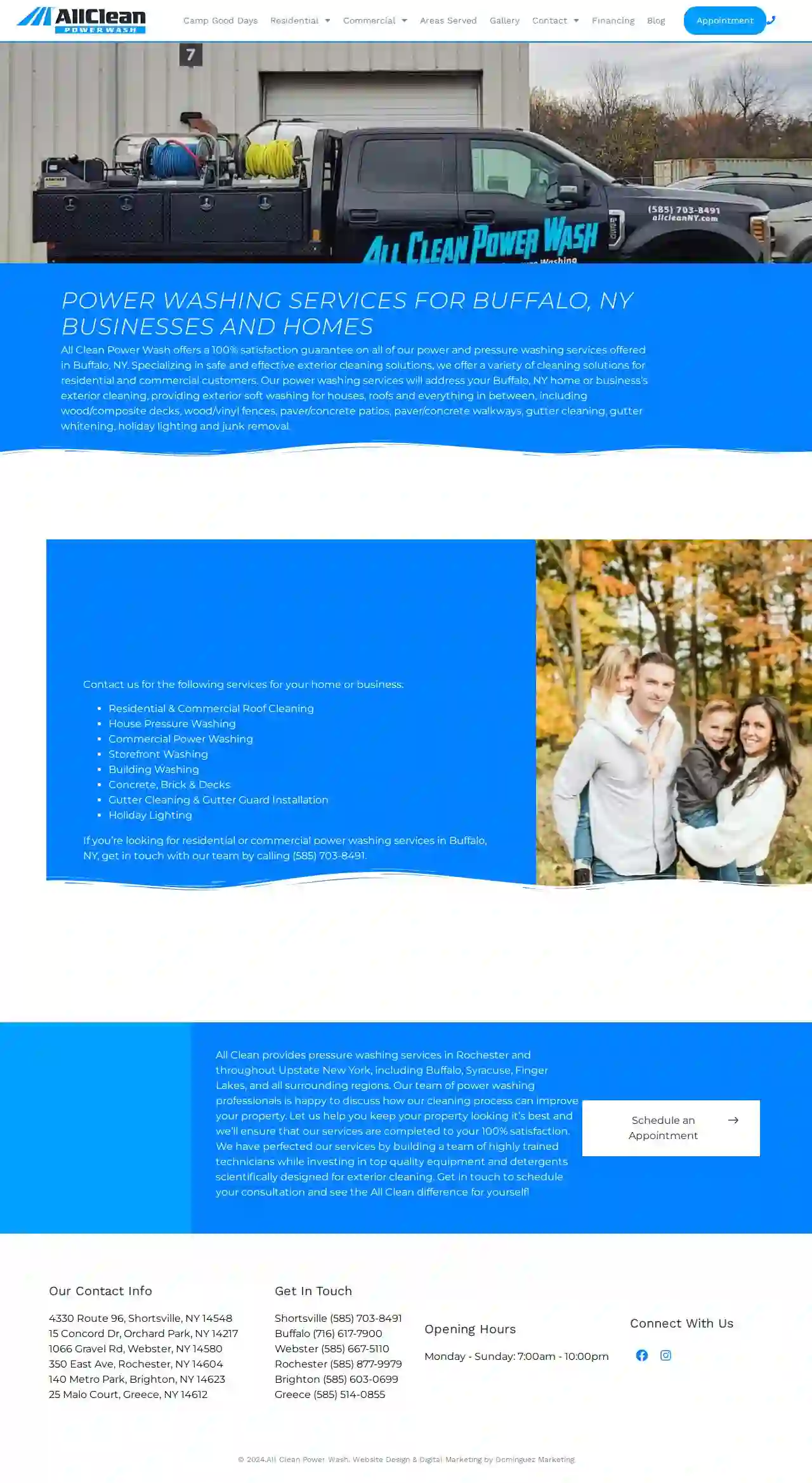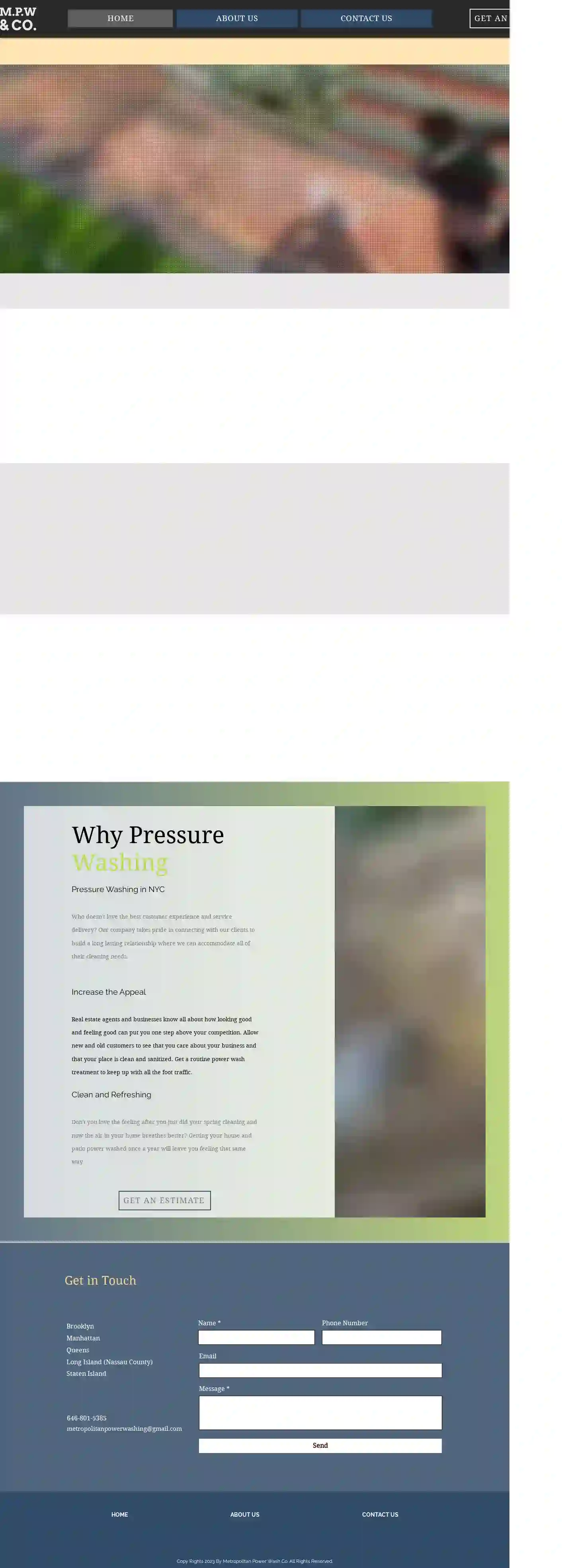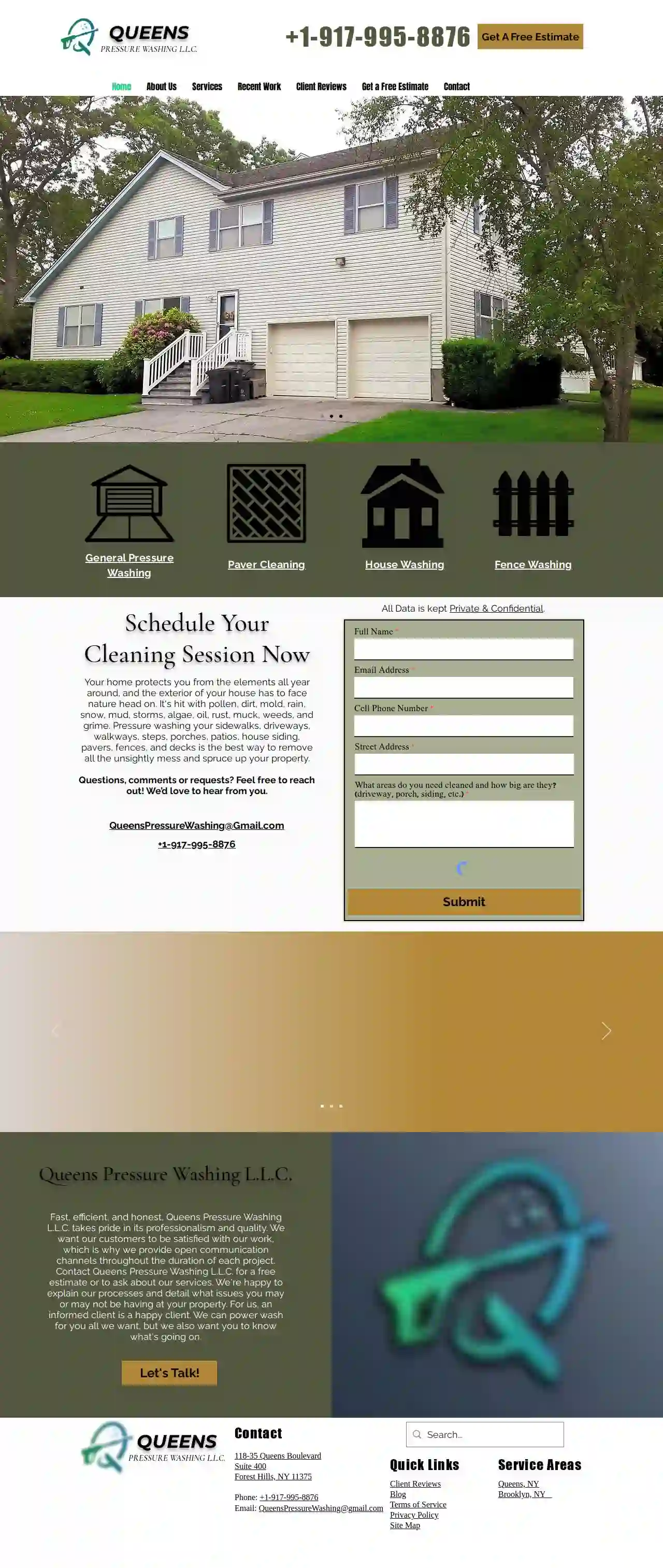Pressure Washing Moreau
Top Pressure Washing in Moreau
Get up to 3 Driveway Cleaning quotes for your project today! Compare profiles, reviews, accreditations, portfolio, etc... and choose the best offer.

Buffalo Exterior Power-washing Specialist
51 reviewsShortsville, NY, N/A, 4330 Route 96, 14548, USAll Clean Power Wash offers a 100% satisfaction guarantee on all of our power and pressure washing services offered in Buffalo, NY. Specializing in safe and effective exterior cleaning solutions, we offer a variety of cleaning solutions for residential and commercial customers. Our power washing services will address your Buffalo, NY home or business’s exterior cleaning, providing exterior soft washing for houses, roofs and everything in between, including wood/composite decks, wood/vinyl fences, paver/concrete patios, paver/concrete walkways, gutter cleaning, gutter whitening, holiday lighting and junk removal.
- Services
- Why Us?
- Accreditations
- Our Team
- Testimonials
- Gallery
Get Quote
Bright house power washing
520 reviews264 Main Street, East Rutherford, 07073, USBright House Power Washing is a locally owned and operated business dedicated to providing top-rated power washing services to transform your home's appearance. Our skilled professionals utilize the latest equipment and best cleaning supplies to effectively remove grime, dirt, algae, and mildew from any surface without causing damage. We offer a comprehensive range of services, including roof cleaning, deck power washing, house soft washing, driveway power washing, and more. We understand the importance of maintaining a clean and pristine exterior for your property. Our power washing process not only enhances curb appeal but also prevents long-term damage to surfaces, saving you money on costly repairs in the future. At Bright House Power Washing, we prioritize customer satisfaction. We are fully insured, professional, and experienced, and we communicate clearly to understand your expectations. We take pride in our work and strive to build lasting relationships with our clients. Call us today to schedule your cleaning service and experience the Bright House Power Washing difference!
- Services
- Why Us?
- Gallery
Get Quote
WNY Pressure Wash
4.984 reviews5145 East Main St Rd, Batavia, 14020, USWNY Pressure Wash is Western New York's premier pressure washing company, proudly serving Erie, Genesee, Wyoming, Niagara, Orleans, Livingston, and Monroe Counties. We specialize in a wide range of pressure washing and soft washing services for both residential and commercial properties. Our team of experts is dedicated to delivering exceptional results using cutting-edge equipment and industry best practices. We are fully licensed, insured, and certified, ensuring your peace of mind. At WNY Pressure Wash, we believe in exceeding customer expectations by providing: * **Excellence:** Unwavering commitment to delivering top-notch service in every project. * **Integrity:** Honesty, transparency, and ethical conduct in all our interactions. * **Customer-Centricity:** Prioritizing your needs and satisfaction above all else. * **Safety:** Uncompromising dedication to the well-being of our team, clients, and the environment. * **Innovation:** Embracing the latest industry advancements and techniques to deliver unmatched results. Whether you need house washing in Buffalo, roof cleaning in Rochester, or any other pressure washing service in Western New York, WNY Pressure Wash is your trusted partner. Contact us today for a free estimate and let us transform your property!
- Services
- Why Us?
- Accreditations
- Our Team
- Testimonials
- Gallery
Get Quote
DC Painting & Pressure Washing
530 reviews123 Main St, Suite 101, Hurricane, 25526, USDC Painting & Pressure Washing is a painting and pressure washing service based in Hurricane, WV. The company is owned by David Clark, who has been in the painting industry for 18 years. DC Painting & Pressure Washing offers exterior and interior painting, staining, drywall repair, and pressure washing services. The company serves various areas including Milton, Teays Valley, Winfield, Hurricane, Charleston, Barboursville, Ona, South Charleston, Huntington, Dunbar, Culloden, and the Tri State Area. The company has received positive testimonials from clients, highlighting their attention to detail, quality work, and customer service.
- Services
- Why Us?
- Accreditations
- Our Team
- Testimonials
- Gallery
Get Quote
Metropolitan Power Wash NYC
510 reviewsBrooklyn, USMetropolitan Power Wash Co. is your trusted partner for all your pressure washing needs in New York City and Long Island. We are dedicated to providing exceptional customer service and delivering outstanding results. Our team of experienced professionals utilizes state-of-the-art equipment and techniques to ensure a thorough and efficient cleaning process. We understand the importance of a clean and inviting environment, and we strive to exceed your expectations. Whether you need residential or commercial pressure washing, we have the expertise and resources to handle any project, big or small.
- Services
- Why Us?
- Gallery
Get Quote
JBLI Power Washing
505 5th Avenue, New Hyde Park, 11040, USJBLI Power Washing is your local pressure washing company, primarily based in Huntington! We bring many years of experience in being the best pressure washing company possible. Our team is driven and dedicated to our clients. Our equipment is stellar, and our mindset is ready for action. We provide the best service to all of our clients because we care about the people we work with just as much as we care about the communities we serve. JBLI Power Washing offers pressure washing services in more than just Huntington! Giving back to the community is crucial. Being able to make an impact on the world through our pressure washing services is truly heart-warming for our teams. Cleaning up your siding, patio, or roof is not only about the cleaning. It is also about presentation. Pressure washing offers a true caterpillar effect to your home and can aid in transforming the once dirty areas into beautiful, boastful, butterfly-worthy spaces.
- Services
- Why Us?
- Gallery
Get Quote
J and E Detail Pressure Washing and Painting
563 reviewsBessemer City, NC, 137 Forest Dellinger Rd, 28016, USJ and E Detail Pressure Washing and Painting is a local veteran-owned and operated maintenance and repair specialist in Gastonia and the surrounding area. They offer a variety of services including pressure washing, painting, and handyman services. Their mission is to build strong relationships with homeowners and businesses through exceptional work, reliability, and consistency.
- Services
- Why Us?
- Accreditations
- Our Team
- Testimonials
- Gallery
Get Quote
Queens Pressure Washing L.L.C.
4.816 reviewsSuite 400, Forest Hills, NY, 118-35 Queens Boulevard, 11375, USQueens Pressure Washing L.L.C. is a professional pressure washing company that offers a variety of services including general pressure washing, softwashing, house washing, brownstone washing, awning cleaning, fence washing, paver cleaning, polymeric sand installation, paver sealing, and stain removal. The company is dedicated to providing high-quality services and ensuring customer satisfaction. They offer free estimates and can be contacted through their website or by phone.
- Services
- Why Us?
- Accreditations
- Our Team
- Testimonials
- Gallery
Get Quote
All Season Wash LLC
4.47 reviews123 Main St, Apt 4, Bronx, 10456, USAll Season Wash LLC is a top-tier name when it comes to effective and affordable exterior cleaning services in Bronx, NY. We specialize in properly cleaning properties, driveways, patios, trucks, and more. Using specialized nozzles and maintaining an appropriate spray distance, we ensure the thorough removal of grime, stains, and mold. Our pressure washers have hands-on experience and certified skills in executing each task efficiently. We work to not only improve the curb appeal of your property but also to keep it clean. With our expertise and work-proven techniques, we are skilled at delivering meticulous outcomes every time. We are available to assist you with any cleaning or maintenance needs, whether they be one-time or ongoing. Need affordable exterior cleaning services in Bronx, NY? Give us a call!
- Services
- Why Us?
- Accreditations
- Our Team
- Testimonials
- Gallery
Get Quote
Advanced Power Washing
563 reviews123 Main St, Brooklyn, NY, 11201, USAdvanced Power Washing is a leading provider of commercial and residential pressure washing services in the Greater New York area. Since our establishment in Brooklyn, NY in 2010, we have washed over 500+ properties using our Advanced Power Washing methods. Our methods combine state-of-the-art equipment, eco-friendly products, and expert techniques to deliver high-quality work and ensure customer satisfaction. We are committed to exceeding your expectations and leaving a lasting impression on our customers.
- Services
- Why Us?
- Accreditations
- Our Team
- Testimonials
- Gallery
Get Quote
Over 60,241+ Cleaning Contractors in our network
Our cleaning pros operate in Moreau and beyond!
CleaningMatch has curated and vetted the Best Cleaning Businesses in Moreau. Find the most reliable contractor today.
Frequently Asked Questions About Pressure Washing
- Electric Pressure Washers: Suitable for light-duty cleaning tasks like washing cars, patios, or fences. They are less powerful than gas pressure washers but are generally more affordable and easier to operate.
- Gas Pressure Washers: More powerful than electric pressure washers, making them suitable for heavier cleaning tasks like removing stubborn stains, cleaning driveways, or stripping paint.
- PSI and GPM: Consider the PSI (Pounds per Square Inch) and GPM (Gallons per Minute) ratings. Higher PSI and GPM indicate a more powerful pressure washer. For most home cleaning tasks, a pressure washer with a PSI of 2000-3000 and a GPM of 2-3 is sufficient.
- Experience and Expertise: Professionals have the knowledge and skills to choose the right pressure levels and cleaning solutions for different surfaces, minimizing the risk of damage.
- Professional Equipment: Pressure washing companies use commercial-grade equipment that is more powerful and efficient than consumer-grade pressure washers.
- Safety: Pressure washing can be hazardous, especially when working on ladders or with high-pressure water. Professionals are trained in safety procedures and have the necessary equipment to work safely.
- Time-Saving: Pressure washing can be time-consuming, especially for larger projects. Hiring professionals frees up your time for other tasks.
- Using Excessive Pressure: High-pressure water spray can damage delicate surfaces like wood siding or painted surfaces.
- Using the Wrong Nozzle: Different nozzles produce different spray patterns and pressure levels. Using the wrong nozzle can cause streaks, uneven cleaning, or damage.
- Holding the Nozzle Too Close to the Surface: Holding the nozzle too close can etch or damage the surface. Maintain a safe distance as recommended by the pressure washer manufacturer.
- Skipping Pre-Treatment: For stubborn stains or mold growth, pre-treating the surface with a cleaning solution can enhance cleaning effectiveness.
- Not Protecting Plants and Landscaping: Pressure washing chemicals and debris can harm plants and landscaping. Cover or shield sensitive areas before pressure washing.
- Reputation and Reviews: Check online reviews and ask for referrals to gauge the company's reputation and customer satisfaction.
- Experience and Expertise: Look for a company with a proven track record and experience in pressure washing various surfaces.
- Licensing and Insurance: Ensure the company is licensed and insured to protect you from liability.
- Equipment and Techniques: Inquire about the company's equipment and techniques to ensure they use appropriate pressure levels and cleaning solutions.
- Quotes and Pricing: Obtain detailed quotes that outline all services and costs.
- Professionalism and Communication: Choose a company that is responsive, communicative, and professional.
What type of pressure washer do I need for my home?
If you're unsure about the type of pressure washer best suited for your needs, consult with a pressure washing professional or a home improvement specialist.
Can I pressure wash my own house?
If you're considering DIY pressure washing, assess the complexity of the project, your experience, and the risks involved. For larger or more challenging projects, hiring professionals is often a wiser and safer choice.
What are some common pressure washing mistakes to avoid?
If you're unsure about pressure washing techniques or the appropriate pressure levels for your surfaces, consult with a professional pressure washing company.
What should I look for in a pressure washing company?
A reputable pressure washing company will prioritize safety, use appropriate cleaning methods, and provide excellent customer service.
What type of pressure washer do I need for my home?
- Electric Pressure Washers: Suitable for light-duty cleaning tasks like washing cars, patios, or fences. They are less powerful than gas pressure washers but are generally more affordable and easier to operate.
- Gas Pressure Washers: More powerful than electric pressure washers, making them suitable for heavier cleaning tasks like removing stubborn stains, cleaning driveways, or stripping paint.
- PSI and GPM: Consider the PSI (Pounds per Square Inch) and GPM (Gallons per Minute) ratings. Higher PSI and GPM indicate a more powerful pressure washer. For most home cleaning tasks, a pressure washer with a PSI of 2000-3000 and a GPM of 2-3 is sufficient.
If you're unsure about the type of pressure washer best suited for your needs, consult with a pressure washing professional or a home improvement specialist.
Can I pressure wash my own house?
- Experience and Expertise: Professionals have the knowledge and skills to choose the right pressure levels and cleaning solutions for different surfaces, minimizing the risk of damage.
- Professional Equipment: Pressure washing companies use commercial-grade equipment that is more powerful and efficient than consumer-grade pressure washers.
- Safety: Pressure washing can be hazardous, especially when working on ladders or with high-pressure water. Professionals are trained in safety procedures and have the necessary equipment to work safely.
- Time-Saving: Pressure washing can be time-consuming, especially for larger projects. Hiring professionals frees up your time for other tasks.
If you're considering DIY pressure washing, assess the complexity of the project, your experience, and the risks involved. For larger or more challenging projects, hiring professionals is often a wiser and safer choice.
What are some common pressure washing mistakes to avoid?
- Using Excessive Pressure: High-pressure water spray can damage delicate surfaces like wood siding or painted surfaces.
- Using the Wrong Nozzle: Different nozzles produce different spray patterns and pressure levels. Using the wrong nozzle can cause streaks, uneven cleaning, or damage.
- Holding the Nozzle Too Close to the Surface: Holding the nozzle too close can etch or damage the surface. Maintain a safe distance as recommended by the pressure washer manufacturer.
- Skipping Pre-Treatment: For stubborn stains or mold growth, pre-treating the surface with a cleaning solution can enhance cleaning effectiveness.
- Not Protecting Plants and Landscaping: Pressure washing chemicals and debris can harm plants and landscaping. Cover or shield sensitive areas before pressure washing.
If you're unsure about pressure washing techniques or the appropriate pressure levels for your surfaces, consult with a professional pressure washing company.
What should I look for in a pressure washing company?
- Reputation and Reviews: Check online reviews and ask for referrals to gauge the company's reputation and customer satisfaction.
- Experience and Expertise: Look for a company with a proven track record and experience in pressure washing various surfaces.
- Licensing and Insurance: Ensure the company is licensed and insured to protect you from liability.
- Equipment and Techniques: Inquire about the company's equipment and techniques to ensure they use appropriate pressure levels and cleaning solutions.
- Quotes and Pricing: Obtain detailed quotes that outline all services and costs.
- Professionalism and Communication: Choose a company that is responsive, communicative, and professional.
A reputable pressure washing company will prioritize safety, use appropriate cleaning methods, and provide excellent customer service.